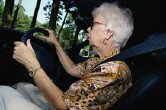
MONDAY, April 12 (HealthDay News) — Scores on a dementia test and input from family members are the most useful tools in determining who is no longer capable of driving when Alzheimer’s or other dementia sets in, according to new guidelines from the American Academy of Neurology.
In fact, family members’ assessments are usually more accurate than the patient’s own opinion of his or her driving abilities in making these decisions, the research shows.
To develop the guidelines, researchers analyzed the results of 422 studies of Alzheimer’s disease or other forms of dementia and driving, and rated each based on the quality of the study and the strength of the findings.
Among the strongest predictors of gauging who would fail a behind-the-wheel driving test: scoring a “1” or higher on the Clinical Dementia Rating, a test used by doctors to assess memory, judgment and the ability to function independently at work, home and in social life. A score of “0” is no impairment; 0.5 indicates very mild dementia; 1 is mild dementia, while scores of 2 and 3 are moderate to severe dementia.
The opinions of family members and caregivers are also helpful, said lead guideline author Dr. Donald Iverson, a neurologist with the Humboldt Neurological Medical Group in Eureka, Calif. In contrast, the patient’s own assessment of his or her skills isn’t really reliable.
One study found that caregivers who rated a patient’s driving as “marginal” or “unsafe” were often right, while another found that 94 percent of people with Alzheimer’s rated themselves as safe drivers, though only 41 percent passed a driving test.
Determining who is still safe to drive can be difficult, Iverson said. Recent research has found that as many as 76 percent of people with mild dementia can still pass behind-the-wheel driving tests, while other research shows drivers with dementia are at a much higher risk of accidents.
Taken together, the research suggests that some people with dementia can still drive reasonably safely, at least at the outset of the disease, Iverson said.
“Patients with mild dementia are at higher risk as a group for unsafe driving. But a lot of them, if not most of them, are safe drivers when put on the road,” Iverson said. “The alarmist group would say that nobody with dementia should be driving. The apologist groups says, wait a minute, as many as 76 percent [of people] with dementia who take the test still pass. It’s probably too categorical a statement to say nobody with dementia should be driving.”
The guidelines were published in the April 12 online issue of Neurology and were to be presented Monday at the American Academy of Neurology’s annual meeting, in Toronto.
Among the other warning signs: a history of crashes; traffic citations; reductions in miles driven; avoiding driving at night, in the rain or other situations; showing aggressive or impulsive personality traits; and scoring low on the Mini-Mental State Examination, another test of thinking skills used to detect impairment.
With driving so important for independence and quality of life, the decision to stop driving is never easy, said Dr. David Knopman, a professor of neurology at the Mayo Clinic in Rochester, Minn.
In addition to memory loss, Alzheimer’s causes problems with geographic orientation, slowed reaction times and slowed mental processing, all of which are necessary for safe driving.
“People with dementia are more likely to be uncertain where they are going and more likely to hesitate in intersections or abruptly change directions — behaviors that would put them at greater risk of having accidents,” Knopman said.
Because of changes in the brain caused by Alzheimer’s, the patient may be unaware there’s a problem, Knopman said. Lapses in judgment are a common symptom of the disease.
“As a doctor, I absolutely have to rely on the family’s observations,” he said. “The brain supports the capacity for insight into your own actions or capabilities. That is critically eroded in patients with Alzheimer’s.”
Some states require doctors to report medical conditions that may impair driving ability.
“All of us who have treated patients with Alzheimer’s have had the experience of discussing cessation of driving and having the patient become very upset. They think their driving skills are excellent,” Knopman said.
More information
The Family Caregiver Alliance has more on driving with dementia.

